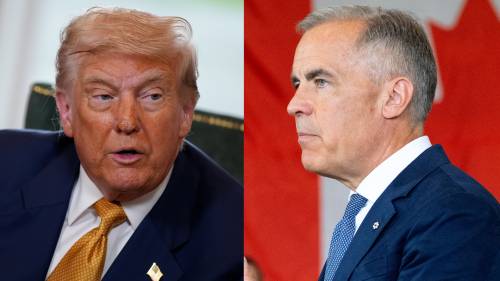As storm clouds gather over global trade relations, former Bank of Canada governor Mark Carney has issued a stark warning about Canada’s economic future. Speaking at a recent economic forum in Toronto, Carney emphasized that securing the right trade agreement with the United States isn’t just desirable—it’s essential for Canada’s long-term prosperity.
“It may seem like it’s a long way off, but Canada needs to be strategically positioned for the next phase of trade negotiations with our largest trading partner,” Carney stated, highlighting the precarious nature of our economic relationship with a country that accounts for nearly 75% of our exports.
The timing of Carney’s comments is particularly significant as both nations approach critical policy crossroads. With the United States potentially facing a shift in trade philosophy after the upcoming presidential election and Canada navigating post-pandemic economic recovery, the stakes couldn’t be higher.
Economic analysts at the Royal Bank of Canada have quantified these concerns, estimating that even minor disruptions to the Canada-US trade corridor could cost the Canadian economy billions annually. “We’re talking about potential job losses in the hundreds of thousands if we don’t get this right,” noted Sophia Richardson, chief economist at Toronto Dominion Bank.
The former central banker, who also led the Bank of England, pointed to emerging sectors as critical components of any future agreement. “Clean technology, critical minerals, artificial intelligence—these aren’t just buzzwords, they’re the foundations of the next century of North American economic cooperation,” Carney explained.
Industry leaders across Canada have echoed these sentiments. “The automotive sector alone represents over $100 billion in cross-border trade,” said Michael Rodriguez, president of the Canadian Automotive Manufacturers Association. “Any new agreement must protect and enhance these established supply chains while creating space for innovation.”
The geopolitical dimension cannot be overlooked either. With China’s growing economic influence and Russia’s continued isolation from Western markets, the North American economic zone has become increasingly important as a counterbalance to shifting global power dynamics.
“What we’re really talking about is economic sovereignty,” Carney added during a follow-up interview with CO24 News. “Canada’s ability to chart its own economic course depends largely on how we negotiate this relationship with the United States.”
Public opinion research suggests Canadians understand what’s at stake. A recent Angus Reid poll found that 78% of respondents consider the US-Canada trade relationship “very important” to their personal economic well-being, regardless of their political affiliations.
Prime Minister Trudeau’s government has signaled that preliminary discussions about future trade frameworks are already underway, though formal negotiations would likely begin after the US electoral cycle concludes.
As the countdown to potentially transformative trade talks begins, Carney’s warning serves as a reminder of Canada’s economic vulnerability and opportunity. The question now facing policymakers, business leaders, and citizens alike is profound: Can Canada secure a trade agreement that both protects our traditional economic strengths and positions us advantageously for the emerging industries that will define the next generation of prosperity?










